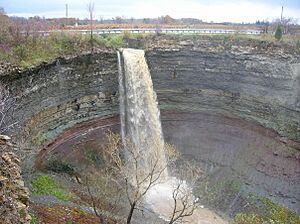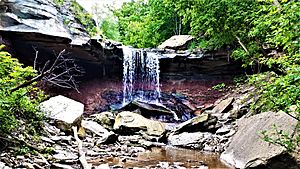Devil's Punch Bowl (Hamilton, Ontario) facts for kids
Quick facts for kids Devil's Punch Bowl |
|
|---|---|

Devil's Punch Bowl
|
|
| Lua error in Module:Infobox_mapframe at line 185: attempt to index field 'wikibase' (a nil value). | |
| Location | Hamilton, Ontario |
| Coordinates | 43°12′37″N 79°45′21″W / 43.2104°N 79.7558°W |
| Type | Ribbon waterfall |
| Total height | 37 m (121 ft) |
| Total width | 11 m (36 ft) |
| Watercourse | Stoney Creek |
The Devil's Punch Bowl is a tall, ribbon-shaped waterfall. It drops 37 meters (about 121 feet) down the Niagara Escarpment. This amazing natural spot is in the Stoney Creek area of Hamilton, Ontario, Canada.
You can find the waterfall inside the Devil's Punchbowl Conservation Area. The Hamilton Conservation Authority takes care of this area. There are trails here, including paths that connect to the Bruce Trail. The Bruce Trail is a very long hiking trail that stretches for 800 kilometers (about 500 miles). The Dofasco 2000 Trail is also nearby.
The Devil's Punch Bowl is sometimes called Horseshoe Falls. This is because the cliff face around it looks a bit like a horseshoe. It reminds people of the much larger Horseshoe Falls at Niagara Falls.
A smaller waterfall, called Lower Punch Bowl Falls, is also close by. It is a curtain waterfall, meaning the water falls in a wide sheet. It is 7 meters (about 23 feet) tall and wide.
Contents
How the Devil's Punch Bowl Formed
The story of the Devil's Punch Bowl goes back a very long time. It started over 450 million years ago. At that time, the area was covered by an inland sea. Materials from this sea bottom slowly turned into the rocks we see today. Things like corals and other sea creatures became fossils within these rocks.
The waterfall itself began to form about 1 million years ago. This was after one of the Earth's big ice ages. Huge sheets of ice covered the land. As the ice melted, a lot of water flowed across the land. These fast-moving streams slowly carved out the deep bowl and cliffs. This is how the Devil's Punch Bowl was created.
Today, the waterfall might not always have a lot of water. Sometimes it dries up or is just a small trickle. But after heavy rain or when snow melts, the stream becomes strong again.
The Cross at the Punch Bowl
There is also a tall, ten-meter (about 33 feet) cross at the Devil's Punch Bowl. It stands high above the Stoney Creek community and Hamilton Harbour. A man named William Sinclair built this cross. He put it up on December 18, 1966. He wanted the cross to bring light and hope to the community.
At first, the cross was only lit up for Christmas and Easter. This was for about six weeks each year. But with help from donations, the cross now lights up automatically every night.
Rocks and Views at the Punch Bowl
The Devil's Punch Bowl is famous among geologists. Geologists are scientists who study rocks and the Earth. This place is special because you can see many different layers of rock. These layers are called stratified rock segments. They show different colors and tell the story of how the Earth changed over millions of years.
Students from McMaster University and other geologists have studied these rock layers. They learn a lot about Earth's history from them.
From the top of the escarpment, you can see amazing views. You can look out over East Hamilton, Burlington, and Stoney Creek. On a clear day, you might even see the skyline of Toronto far away!
Fun and Entertainment
The Devil's Punch Bowl has been a filming location for movies and TV shows.
- In the 2006 movie Silent Hill, a scene was filmed at the edge of the Devil's Punch Bowl.
- The 1998 movie The Big Hit also filmed scenes here. The waterfall and the area around it were shown in the film.
- In 1989, a stunt performer named Super Dave Osborne did a human yo-yo stunt at the Devil's Punch Bowl.
Nearby Places to Visit
Besides the trails, there are other interesting places close to the Devil's Punch Bowl:
- The historic Battlefield House Museum and Nash-Jackson House.
- Fifty Point Conservation Area and Confederation Park, both on Lake Ontario.
- Mohawk Sports Park and the Hamilton Museum of Steam & Technology in Hamilton.
 | Jackie Robinson |
 | Jack Johnson |
 | Althea Gibson |
 | Arthur Ashe |
 | Muhammad Ali |


